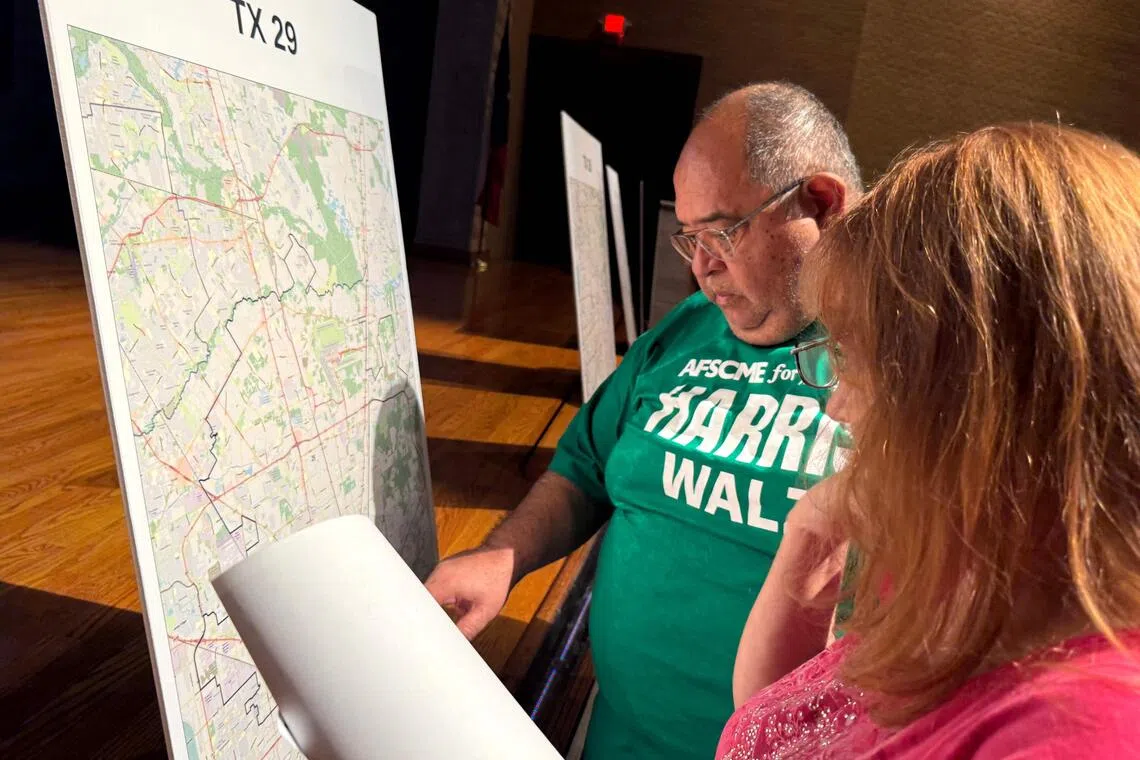Trump redistricting gamble teeters as Democrats gain ground
Sign up now: Get ST's newsletters delivered to your inbox

Voters looking at a map to understand the new redistricting maps approved by Texas lawmakers for the 2026 mid-term elections, in Houston, Texas, on Aug 27.
PHOTO: AFP
WASHINGTON – US President Donald Trump’s bid to lock in Republican rule in the 2026 US elections with an unprecedented mid-decade redistricting sweep could be coming undone – and threatening to gift the Democrats an unexpected advantage.
Breaking with political tradition, the President has pressed conservative states to redraw their congressional maps years before the next census, arguing that Republicans are “entitled” to grow their thin majority in the US House of Representatives.
His party initially seemed well positioned – they control more state legislatures and map-drawing processes – but the strategy has stumbled.
The Democrats, once bracing for losses in a redistricting arms race, are now hopeful of netting around five seats – and possibly more – as courts and state officials weigh in.
The biggest blow came last week when a federal court struck down Texas’s new map
The Democrats’ momentum was partially checked on Nov 21 when the conservative-majority US Supreme Court allowed Texas to put its disputed map back into effect while justices review the case. But the effort remains mired in uncertainty.
“No one is going to win the redistricting battle,” said Republican political writer Patrick Payton, a pastor and business leader who has served as the mayor of the Texan city of Midland.
“It is a zero-sum game where the executive and legislative branches both seek to manipulate outcomes by redrawing maps rather than leading and governing in such a way as to gain trust and votes.”
The Texas ruling followed a court defeat in Utah and resistance from Republican lawmakers in Indiana, Kansas and New Hampshire who have balked at White House pressure.
Playing with fire?
Frustration is rising, with some arguing the Republicans should be concentrating on campaigning, not cartography.
“Donald Trump and (Governor) Greg Abbott played with fire, got burned – and democracy won,” California Governor Gavin Newsom declared after the Texas map began running into problems.
The Lone Star State’s quick appeal could be viewed favourably by the US Supreme Court, which has previously overturned some rulings that blocked Mr Trump policies.
But for now, the Democrats are advancing.
Voters approved a new map drawn by the party in California
Combined with the Utah ruling, analysts believe Democrats could be up by nine seats when the maps are all finalised, if Texas goes their way.
The Republicans have logged their own successes – North Carolina may have added a conservative-leaning seat, and Missouri redrew its map, at Mr Trump’s urging, to eliminate a Democratic district. But both face legal challenges.
Elsewhere, progress is slow. Florida’s legislature meets Dec 4 to consider whether to begin redistricting, and Governor Ron DeSantis has urged voters to “stay tuned”.
But the tit-for-tat is accelerating, prompting Democratic countermeasures in blue states.
“They started this redistricting fight. We will end it,” House Democratic leader Hakeem Jeffries vowed to reporters.
Time is short, as candidates need boundaries before party primaries in early 2026. The Supreme Court’s full ruling on Texas could still come within weeks. Filing deadlines begin Dec 8, and primaries start in March.
‘Years of litigation’
Meanwhile, the high court is weighing a major Voting Rights Act challenge from Louisiana that could shrink the number of Black and Latino majority districts nationwide, potentially giving the Republicans a dozen seats.
Whether that drama affects the midterms will depend on timing.
Lower courts are reviewing maps in multiple states, and voters in New York have sued to change a Staten Island–based district that could hand Democrats another seat.
Tensions are also rising in Republican-led states.
In Indiana, after Mr Trump attacked local officials over their hesitancy to act, state Senator Greg Goode was “swatted” – a dangerous hoax that summoned armed police to his home.
With control of the US House at stake – Republicans hold a narrow 219–213 majority – the risks are enormous. Mid-decade redistricting is unusual, and both parties fear each aggressive move provokes another.
“Betting on maximal maps in as many states as possible made sense if courts kept to the sidelines, but... there is a line on racial gerrymandering,” political analyst Michael Ashley Schulman said.
“And once you cross it you invite years of litigation that can boomerang into less favourable redistricting.” AFP


